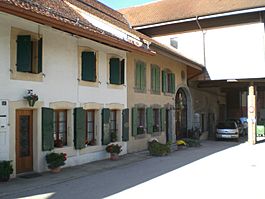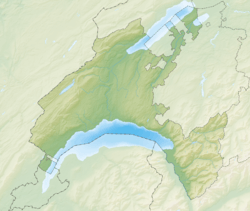Étagnières facts for kids
Quick facts for kids
Étagnières
|
||
|---|---|---|

A farm in Étagnières
|
||
|
||
| Country | Switzerland | |
| Canton | Vaud | |
| District | Gros-de-Vaud | |
| Area | ||
| • Total | 3.78 km2 (1.46 sq mi) | |
| Elevation | 628 m (2,060 ft) | |
| Population
(Dec 2020 )
|
||
| • Total | 1,146 | |
| • Density | 303.2/km2 (785.2/sq mi) | |
| Postal code |
1037
|
|
| Surrounded by | Assens, Bioley-Orjulaz, Boussens, Cheseaux-sur-Lausanne, Morrens | |
Étagnières is a small town, or municipality, located in the canton of Vaud in Switzerland. It's part of the Gros-de-Vaud area.
Contents
- A Look Back in Time: Étagnières' History
- Exploring Étagnières: Geography and Land Use
- Understanding the Town's Symbol: Coat of Arms
- Who Lives in Étagnières? Population and People
- Working in Étagnières: Economy
- Getting Around: Transport
- Beliefs and Faith: Religion
- Learning and Schools: Education
- See also
A Look Back in Time: Étagnières' History
Étagnières was first mentioned way back in 1202. Its name then was Etanneres. Archaeologists have found signs of an old Roman-era metal workshop here. This shows people lived and worked in the area a very long time ago!
Exploring Étagnières: Geography and Land Use
Étagnières covers an area of about 3.79 square kilometers. That's roughly 1.46 square miles. Most of this land, about 74%, is used for farming. This means lots of fields for crops and pastures for animals. About 15% of the area is covered by forests. These are important natural spaces. The remaining 10% is where buildings and roads are located. This is the settled part of the town. A tiny part, less than 1%, is made up of rivers or lakes. All the water in Étagnières is flowing water.
Until 2006, Étagnières was part of the Échallens District. Then, it became part of the new Gros-de-Vaud district. The town is located in the Gros-de-Vaud region.
Understanding the Town's Symbol: Coat of Arms
Every town has a special symbol called a coat of arms. It's like a unique badge for the municipality. The coat of arms for Étagnières is red. It has three wavy gold lines across it. On top of these lines, there is a black raven standing. This design helps represent the town's identity.
Who Lives in Étagnières? Population and People
Étagnières has a population of about 1,190 people as of 2023. About 16.6% of the people living here are from other countries. Over the last ten years, the population has grown by about 17.9%. This growth is due to people moving in and new births.
Languages Spoken in Étagnières
Most people in Étagnières speak French. About 90% of the population uses French. The second most common language is German, spoken by about 2.5% of residents. Italian is the third most common, spoken by about 2.4%. There is also one person who speaks Romansh.
Where People Come From
About 21.5% of the people living in Étagnières in 2000 were born there. Around 44.6% were born in the same canton, which is Vaud. About 14.6% were born in other parts of Switzerland. And 17.5% of the residents were born outside of Switzerland.
Population Changes Over Time
In 2008, there were 6 babies born to Swiss citizens and 4 deaths. This meant a small increase in the Swiss population. More people moved into Étagnières than left it. This helped the town's population grow. Overall, the population of Étagnières increased by about 1.5% in 2008.
Age Groups in Étagnières
The population of Étagnières includes people of all ages. About 12.5% are children aged 0 to 9 years old. Teenagers, aged 10 to 19, make up about 13.9% of the population. Adults aged 20 to 59 make up a large part of the population. Seniors, aged 60 and above, make up about 19.3% of the population.
Homes and Households
In 2000, there were 307 private homes in Étagnières. On average, about 2.4 people lived in each home. About 30% of homes had only one person living in them. There were also many homes with married couples, some with children and some without. A smaller number of homes had single parents with children.
Most of the buildings in Étagnières are single-family homes. There are also some multi-family buildings and buildings used for both homes and businesses. In 2000, there were 324 apartments in the town. Most apartments had 4 rooms. About 90% of these apartments were lived in all the time. A small number were used seasonally or were empty.
The chart below shows how the population of Étagnières has changed over many years:

Working in Étagnières: Economy
In 2010, the unemployment rate in Étagnières was about 3.1%. This means most people who wanted to work had jobs. The town has different types of jobs.
- The primary sector involves farming. About 23 people worked in this area.
- The secondary sector includes manufacturing and construction. Around 124 people worked here.
- The tertiary sector covers services like sales, transport, hotels, and finance. About 224 people worked in this sector.
Many people who live in Étagnières also work in other towns. Similarly, some people from other towns come to work in Étagnières. About 13% of workers used public transportation to get to work. Most, about 65%, used a private car.
Getting Around: Transport
Étagnières has two railway stations. They are called Étagnières and Les Ripes. These stations are on the Lausanne–Bercher line, which is a local train line.
Beliefs and Faith: Religion
Based on a 2000 survey, about 49.9% of the people in Étagnières were Roman Catholic. About 33.4% belonged to the Swiss Reformed Church. A smaller number of people belonged to other Christian churches, or were Islamic. About 10.6% of the population did not belong to any church or had no specific religion.
Learning and Schools: Education
Many adults in Étagnières have completed a good level of education. About 41.4% have finished non-mandatory high school education. About 10.1% have gone on to higher education, like university.
Schools in Étagnières
In the 2009/2010 school year, there were 125 students in the Étagnières school district. The local school system offers pre-school for young children. Students attend primary school for four years. There were 64 students in the primary school program. After primary school, students go to lower secondary school for six years. There were 60 students in these schools. Some students also learned at home or attended other types of schools. In 2000, 60 students came from other towns to study in Étagnières. At the same time, 100 residents of Étagnières went to schools outside the town.
See also
 In Spanish: Etagnières para niños
In Spanish: Etagnières para niños
 | Sharif Bey |
 | Hale Woodruff |
 | Richmond Barthé |
 | Purvis Young |




